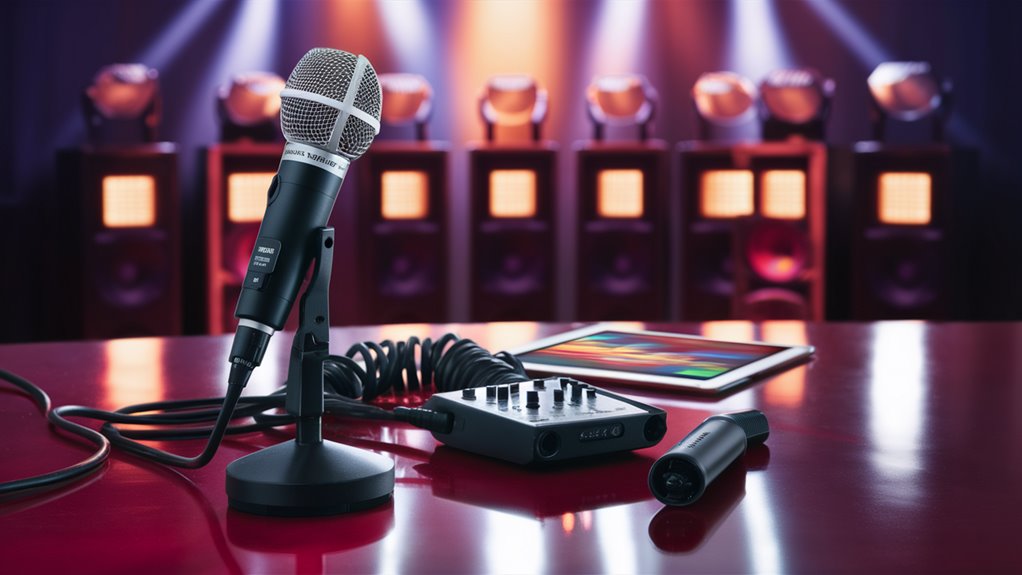How to Have the Best Karaoke Time at Your Party

Essential Setup and Equipment
Start by setting up your karaoke gear to work its best. Keep digital screens at eye level and check your sound system setup to avoid any sound issues. Position your speakers correctly so everyone can see clearly.
Smart Song Choices
Create a great mix karaoke list with the 70-30 rule:
- 70% popular songs that everyone can sing along to
- 30% for the experts with strong song skills
- Various music types like pop, rock, and classic hits
- Songs for everyone, from beginners to experts
Managing Singers and Keeping Things Flowing
Keep the party going with smart planning:
- Pair new singers with experts
- Add shy singers when the vibe is energetic
- Include group songs to entertain the crowd
- Alternate between fast and slow songs
- Ensure one singer is ready as another finishes
Top Sound and Technology
Ensure you have high-quality sound throughout your event:
- Adjust microphone levels properly
- Tune bass and treble for clear vocals
- Balanced music and singing volumes
- Have spare equipment ready to use
- Keep your gear cool and well-ventilated
Implementing these key steps will create a fantastic karaoke experience that engages everyone from start to end.
The Best Way to Arrange Your Karaoke Zone
Important Equipment Places
Position screens just right for a fun karaoke night. Set your karaoke monitor at eye level, visible from all seating areas.
Smartly place speakers to surround the singing area for the best sound distribution.
Keep your microphone setup away from speakers to eliminate feedback problems.
How the Singing Area Should Look
Create a designated singing spot with excellent stage lights.
Install soft lighting in the singer’s area and keep it comforting for the audience.
Allow enough space for singing for duos and groups, ensuring movement is possible.
Technology Setup and Operation
Build a simple-to-operate gear station that allows quick access and clear visibility to everyone.
Organize your song list on your system for easy navigation.
Before events, perform a complete equipment check on:
- Sound setup
- Microphone tests
- Screen resolution adjustments
- Backup equipment review
Having Backup Equipment
Keep a complete set of spares that includes:
- Additional microphones
- Extra sound cables
- Backup power supplies
- Emergency lighting solutions
This ensures the show continues no matter what, maintaining high energy throughout the event.
How to Select the Best Songs: Important Choices and Levels

When creating your song list, selecting suitable song keys and appropriate difficulty levels are crucial for success.
Ensure a balanced mix for all singers:
Songs for New Singers
- Simple melodies
- Songs in easy keys like C, G, or F
- Basic chords
- Slow-tempo songs for easier timing
- Few challenging parts
More Challenging Options
- Songs with high and low notes
- Complicated melodies
- Songs with key changes
- Difficult vocal parts
- Complex rhythms
Correctly Balancing the Mix
Maintain a 70-30 ratio of simple to challenging songs ensuring more participation while pushing skilled singers as well.
Consider modifying popular songs to simpler keys to include more singers without compromising quality.
Guiding Seamless Karaoke Singing
Selecting Songs and Pacing Correctly
Managing a great karaoke session requires thoughtful planning and monitoring the energy levels.
Start with mid-tempo songs to set the mood and build confidence in singers.
As the evening progresses, introduce upbeat songs to elevate the atmosphere while keeping the audience engaged.
Adjusting Mood and Song Variety
Vary song speeds to keep the excitement fresh all night.
Space out different tunes and singers to create a vibe that keeps everyone energetic and not overwhelmed.
When energy dips, bring in crowd-favorite songs or more group performances to boost morale.
Coordinating Singers and Managing Turns
Efficient turn management ensures everyone gets a chance and prevents one person from monopolizing the microphone https://getwakefield.com
Create a balanced mix by pairing professionals with new singers, fostering an environment where everyone supports one another.
This approach maintains steady energy and encourages newcomers to participate.
Planning for Variability and Timing
Keep the energy flowing with prepared backup singers and precise timing.
Plan who sings when, ready for both scheduled and spontaneous performances, while ensuring the event ends punctually features you never knew existed
Make space for last-minute performances and aim to conclude on a high note.
Remember details like:
- Song sequence plans
- Planning karaoke sessions
- Choosing the next singer
- Maintaining the right energy
- Keeping the audience entertained
Assisting Shy Singers at Karaoke
Making It Comfortable for Everyone
Create an environment where everyone feels included to help shy participants feel ready to sing.
Establish a no-judgment policy from the start, emphasizing that karaoke is more about fun than perfection.
This foundation fosters a space where nervous singers can gradually become comfortable.
Encouraging Them to Sing
Engage with them individually rather than just addressing everyone.
Offer opportunities to sing in groups or duos, which is less intimidating.
Simple group songs like “Sweet Caroline” or “YMCA” encourage shy participants to join in with less anxiety in a large group.
Selecting Suitable Songs and Timing Their Performances
Choose songs thoughtfully to build confidence in shy singers.
Simple songs like “Sweet Home Alabama” or “Hey Jude” are ideal as they make uncertain singers feel more at ease.
Introduce shy singers during high-energy moments when crowd support is strongest. For the very nervous, opt for short songs or familiar favorites they enjoy.
Backup Support and Assistance
Have a team of experienced singers ready to step in and assist.
This support team ensures that shy participants never feel alone on stage.
Having backup singers on standby provides a safety net, making it easier for apprehensive participants to attempt something new while keeping the karaoke fun ongoing.
